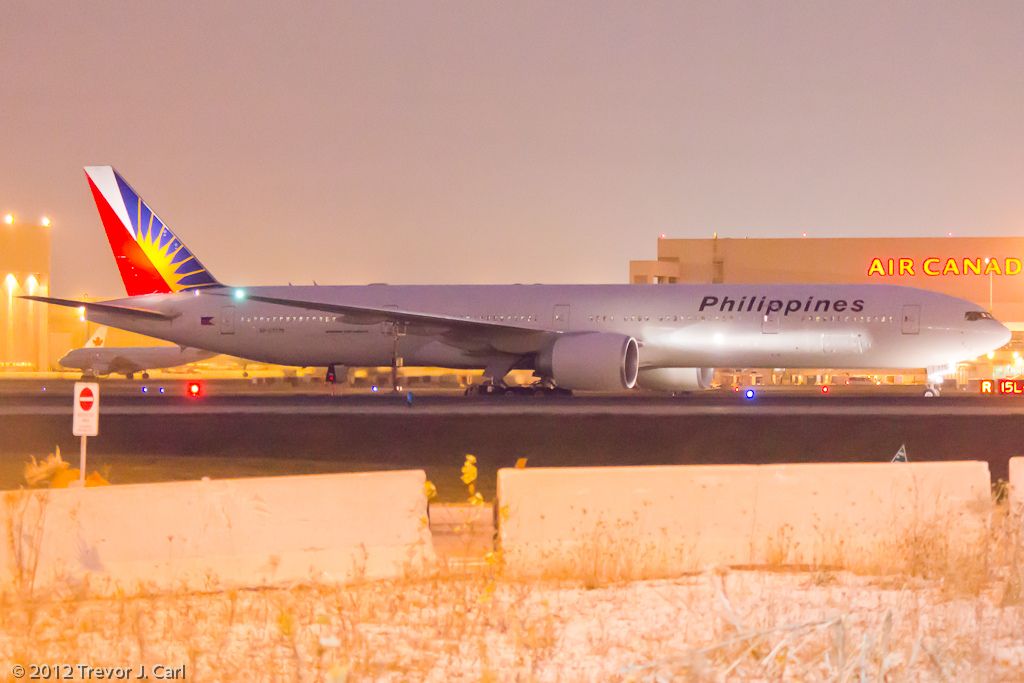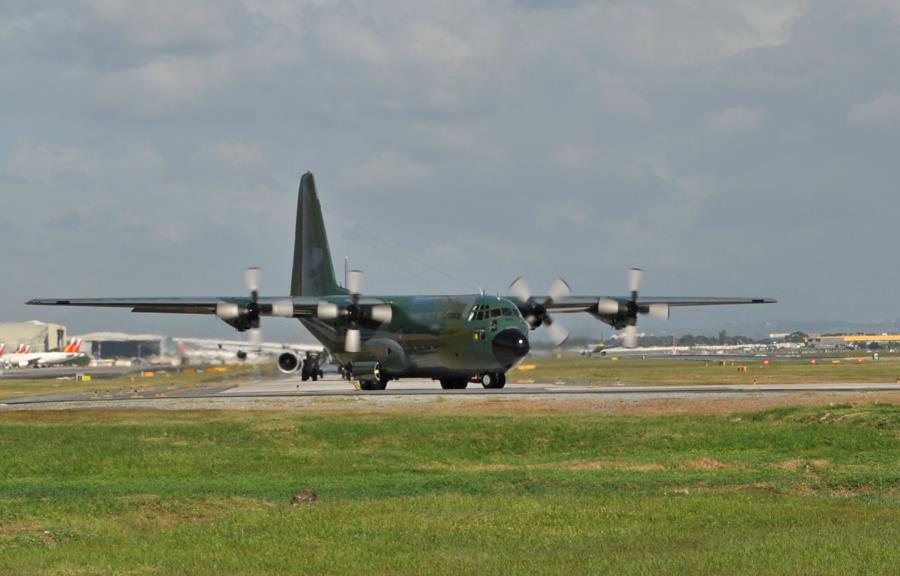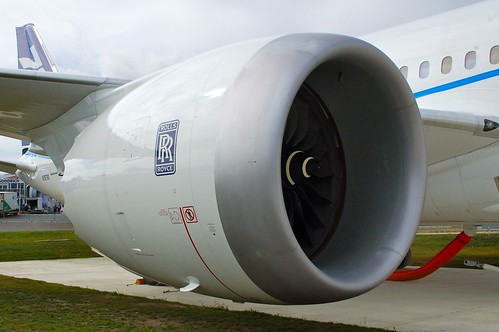December 3, 2012
By Boo Chanco

 |
| Philippine Airlines has return to Toronto after 15 long years absence flying three times a week. However Starting January 16, 2013, the Toronto flights will increase to four
times a week with temporary stopovers at Vancouver and on March 10, 2013, the service
will become daily, with the addition of three non-stop flights every
week. At the foreground is RP-C7775 arriving Toronto Pearson Airport on Nov. 30 |
|
|
|
|
|
|
|
It was a fiesta atmosphere at Toronto’s Pearson International Airport
to mark the arrival of Asia’s first airline in Canada’s premier city.
They even had Filipino folk dances performed at the airport by a dance
troupe of local Filipino youth. Tomorrow (Sunday in Manila), Kapamilya
stars Rachel Ann Go and Toni Gonzaga will lead the launch of the PAL
Toronto service and promote The Filipino Channel (TFC) at the Paskuhan
Village at the Metro Toronto Convention Channel. Both stars traveled
with us from Manila on the inaugural flight.
PAL had been serving the Pacific coastal city of Vancouver for a
number of years now but this is the first time it is flying directly
from Manila to Toronto on Canada’s eastern flank. The inaugural flight
was on a brand new Boeing 777-300ER (RP-C7775 arrive in July while RP-C7774 arrive in November), which arrived last Nov. 7 direct
from Boeing’s plant in Seattle, Washington. The flight has set new high
standards for the airline.
I see it as the coming out party for San Miguel Corporation’s Ramon
S. Ang who has worked tirelessly over the last few months to re-make the
airline which many have commented has seen a lot better days.
Unfortunately, RSA managed to get only as far as the send off ceremonies
at NAIA T2 because he had a respiratory problem similar to that which
afflicts P-Noy. His doctor warned him that if he braved Toronto’s sub
zero winter weather, he would be courting pneumonia.
When RSA was thinking of getting into PAL, we talked about the pros
and cons of such a move. I must confess I wasn’t too upbeat about the
chances of the airline being saved. It had a dismal financial
performance year after year and it carried the burden of being the flag
carrier of a country under Category 2 of the US FAA and also banned from
flying in European airspace.
RSA had his doubts too and at one point, I thought he gave up on the
thought of being a white knight to save the airline. But through all our
conversations, I could sense that deep in his heart, RSA wanted to take
on the challenge.
He talked like a little boy eagerly anticipating Santa Claus on
Christmas Eve as we chewed the merits of San Miguel getting into PAL. I
thought like a San Miguel shareholder worried about acquiring what
looked like a dead weight of an investment. In an era dominated by low
cost carriers, PAL was a legacy airline burdened by an excess of staff
that are older than that of its competitors and not as well versed in
the use of new technology for marketing and operations.
But RSA was sure he could turn PAL around, if that is the last thing
he will do ever. He told me that he is a mechanic and a pilot and he has
proven his marketing skills in San Miguel. He is confident he has what
it takes to make Filipinos proud of its flag carrier again.
So he managed to convince Lucio Tan to let him buy a minority share
in the airline but to let him manage it. The taipan, possibly too tired
of the airline’s many problems and its continuing cash drain, agreed to
let RSA and San Miguel in.
When I heard the news, I was glad for PAL and RSA. I thought it will
be good for both. I also relished the thought that San Miguel beer will
once again be available in PAL flights.
The big problem that RSA faced upon assuming management control of
the airline is what to do with all those new B 777s that have been
delivered and soon to be delivered. The 777s are ideal for the Manila
trans-Pacific flights to the US West Coast but because the Philippines
was in Category 2, PAL cannot change aircraft types, even if the
aircraft was made by a US company.
Eventually, the decision was made to field its brand-new, Boeing 777,
on the 15-hour, non-stop flight to Toronto. The luxurious wide-body jet
is especially designed for such ultra-long-haul, intercontinental
journeys. Its two GE 90-115BL engines – the largest and most powerful
ever built – can readily cover the 13,230 kilometers between the two
cities non-stop.
 |
| PAL President Ramon S. Ang (center) flanked by (from left) Tourism
Undersecretary Daniel Corpuz, Canadian Ambassador Christopher Thornley,
Transportation Undersecretary Jose Lotilla and Miaa General Manager Jose
Angel Honrado |
The inaugural flight to Toronto was also an opportunity to launch the
airline’s make-over. With 42 seats in Mabuhay Class (business) and 328
in Fiesta Class (economy), the configuration is designed to give
passengers a taste of what it is to be pampered with PAL’s new signature
inflight service.
Forget those old bulky business class seats in the 747s that often
don’t work to maximize comfort. The 777s feature plush, well-appointed
Recaro seats that recline to a lie-flat angle.
Cuisine is also much improved. Gone are the days when all I really
wanted on those long flights to Los Angeles was the lugao. Well known
chefs now work to satisfy palates like never before.
The Manila-Toronto run will give the Philippine flag carrier a direct
link to Canada’s largest city. It is also the airline’s first gateway
on the vital East Coast of North America in 15 years. From Toronto, it
is just a skip and a hop to both New York and Chicago, among the more
important cities for the Filipino community in North America.
RSA however emphasized that he was also “always keen to develop new
markets and Toronto, with its diverse population, booming economy and
status as one of the world’s top financial centers, presents us a major
opportunity to do so.”
“There has long been a big clamor from our customers in Toronto and
all along Canada’s eastern seaboard, particularly the large Filipino
community, for a PAL service to their part of the country,” he added.
“We heard them loud and clear, and we’re excited to serve them.”
Indeed, Filipinos represent the third largest Asian Canadian Group.
The Indian and Chinese communities rank first and second, respectively
in terms of size among Asian Canadian groups.
Some 200,000 Filipinos live in the Greater Toronto area. The second largest concentration is in Vancouver at about 111,000.
Next is Winnipeg with 70,000. When I visited Winnipeg over five years
ago, I noticed that there is a Filipino town on the way from the
airport with Tagalog names for the streets like Mabuhay among others. I
was told Winnipeg was an export garments manufacturing hub and many
Filipinos worked in the factories.
Many new Filipino migrants end up in the boom metropolis of Calgary,
which benefited from the energy sector. It now hosts about 55,000
Filipinos.
There are about 60,000 Filipinos in Montreal and 50,000 in Edmonton.
When Canadian Prime Minister Stephen Harper visited Manila early this
month, he commented that Tagalog is now the fastest growing language in
Canada. Harper also said Filipino communities are the fastest growing
in Canada, even in the farthest and most remote areas.
Flying to Toronto may prove to be a good business decision. Not only
does PAL have a growing Filipino market, it also allows use of its new
Boeing 777-300ER aircrafts, pending the upgrade of our status to
Category 1. It will also mark the latest product improvements since San
Miguel Corporation (SMC) took management control of the flag carrier in
April 2012.
With this Toronto inaugural flight, Ramon S. Ang is serving notice
that Asia’s oldest airline is now also Asia’s newest… newest fleet…
newest reiteration of the world renown Filipino service quality. Hope it
works. For now, it sure made Filipino hearts in this city where
temperature is six degrees below zero, warm with pride.














